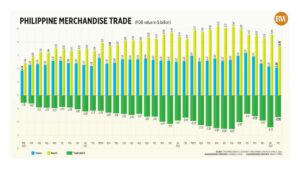Ramos honored for his accomplishments on economy, peace, diplomacy

TRIBUTES poured in for the late Philippine President Fidel V. Ramos, who passed away Sunday, with business groups and state agencies honoring his achievements for the country’s economy, good governance reforms, the peace process in the south, and foreign policies.
The business community recognized Mr. Ramos, who was also commonly referred to by his initials FVR, for initiating structural reforms and good governance programs during his presidential term from 1992 to 1998.
“His administration was distinguished by impressive reforms on energy, economic liberalization, infrastructure and social reform, among others, which fuelled an engine for national progress built on his twin themes of people empowerment and global competitiveness,” the Management Association of the Philippines (MAP) said in a statement.
“His good governance program is unparalleled. He has undoubtedly served the country with the highest standards of professionalism, integrity and transparency,” it added.
MAP said Mr. Ramos’ “unifying leadership” and push for complete staff work “has become and should continue to be the benchmark for national and local governance.”
The Supreme Court said its members will remember Mr. Ramos as a proponent of justice and judicial reform.
“During his presidency, he consistently pledged his support to the Judiciary’s campaign for modernization and judicial excellence,” it said in a statement. “His commitment to justice helped strengthen the Judiciary.”
President Ferdinand R. Marcos, Jr. has already declared a 10-day period of national mourning over the passing of Mr. Ramos.
In Congress, resolutions were adopted at both the Senate and House of Representatives expressing sympathy and mourning for FVR’s death while legislators issued statements recognizing his pivotal role in Philippine history.
Senate President Juan Miguel F. Zubiri said FVR will be remembered for his Philippines 2000 program, which envisioned the country as a newly industrialized nation by the turn of the century, and turning a nation that was then dubbed as the Sick Man of Asia into Asia’s Next Tiger Economy.
Senator Risa Hontiveros-Baraquel, for her part, said Mr. Ramos was one of the “most dogged navigators” of the Philippines’ “contested democracy.”
She said that Mr. Ramos made a strong foundation for political recovery and economic stability, “which reinvigorated a country emerging from the very dark shadow of the Martial Law dictatorship.”
Mr. Ramos helped topple the late dictator Ferdinand E. Marcos’ regime as one of his military generals.
“His experience as a military general and his innate charm set the blueprint for what Philippine leaders should be: tough when necessary, but with a caring heart for the common Filipino,” House Speaker Martin G. Romualdez said.
He was hailed as a hero by many Filipinos for leading a coup against the dictator and supporting his successor in 1986.
Ms. Hontiveros said Mr. Ramos’ “clear articulation of Philippines 2000 engaged many stakeholders, giving our country a chance to stand tall beside other Asian economies.”
Senate President Pro-Tempore Loren B. Legarda described him as an executive chief who promoted people empowerment and global competitiveness, saying that he “left a legacy that demonstrated resolute courage, excellent leadership and unwavering allegiance.”
“He led various economic reform initiatives which pushed for the deregulation of key industries and the liberalization of the economy and encouraged the privatization of public entities, to include the modernization of public infrastructure through an expanded Build-Operate-Transfer law,” she said. His policies and programs stabilized the country’s economy.
At the same time, Ms. Hontiveros noted that some of Mr. Ramos’ policies somehow widened inequality in the Philippines.
“The liberalization and deregulation of too many industries, while a boon for foreign investors then, started to widen inequality here at home,” she said.
Mr. Ramos’ market-driven policies are among the reasons why the promises of the “EDSA project” remain largely unfulfilled, the senator said.
“Ironically [it even enabled] the political comeback of the heir of the dictatorship,” she said. “It is now up to our generation to realize a more equitable distribution of wealth and opportunities, as Filipinos face inflation, poverty, hunger, and unemployment today.”
PEACE TALKSMr. Zubiri, who comes from the southern island of Mindanao, also credited the former military general for the signing of a peace agreement with the Moro National Liberation Front (MNLF) in 1996 and for bringing the Spratlys issue to the world’s attention.
Lanao Del Sur Rep. Zia A. Adiong, in a tweet, said Mr. Ramos’ pursuit of negotiations with both the MILF and the Moro National Liberation Front paved the way for “major developments in the area of peace process.”
“We enjoy what we have in the BARMM (Bangsamoro Autonomous Region in Muslim Mindanao) right now because of him. It all started with him,” Mr. Adiong said.
The Department of Foreign Affairs (DFA), meanwhile, said in a statement: “President Ramos was widely considered as a ‘foreign policy’ president who shaped the evolution of the DFA by instituting economic diplomacy and the protection of overseas Filipinos as pillars of Philippine foreign policy.
During his term, he focused on post-Cold War opportunities offered in multilateral and economic diplomacy, and raised the profile of the Philippines in the region and globally.
“His contributions to our foreign policy will continue to benefit future generations of Filipinos. The DFA community extends its support and prayers to the Ramos family at this difficult time,” Foreign Affairs Secretary Enrique A. Manalo said in a tweet on Monday.
Foreign nations have also expressed their sympathies, including the United States, Japan, France, Canada, Israel, New Zealand, Denmark, Australia, India, Taiwan, and the European Union. — Kyle Aristophere T. Atienza, Alyssa Nicole O. Tan, and Matthew Carl L. Montecillo




